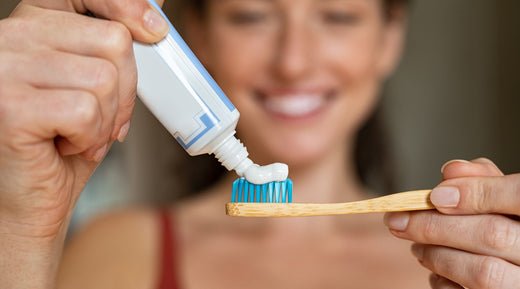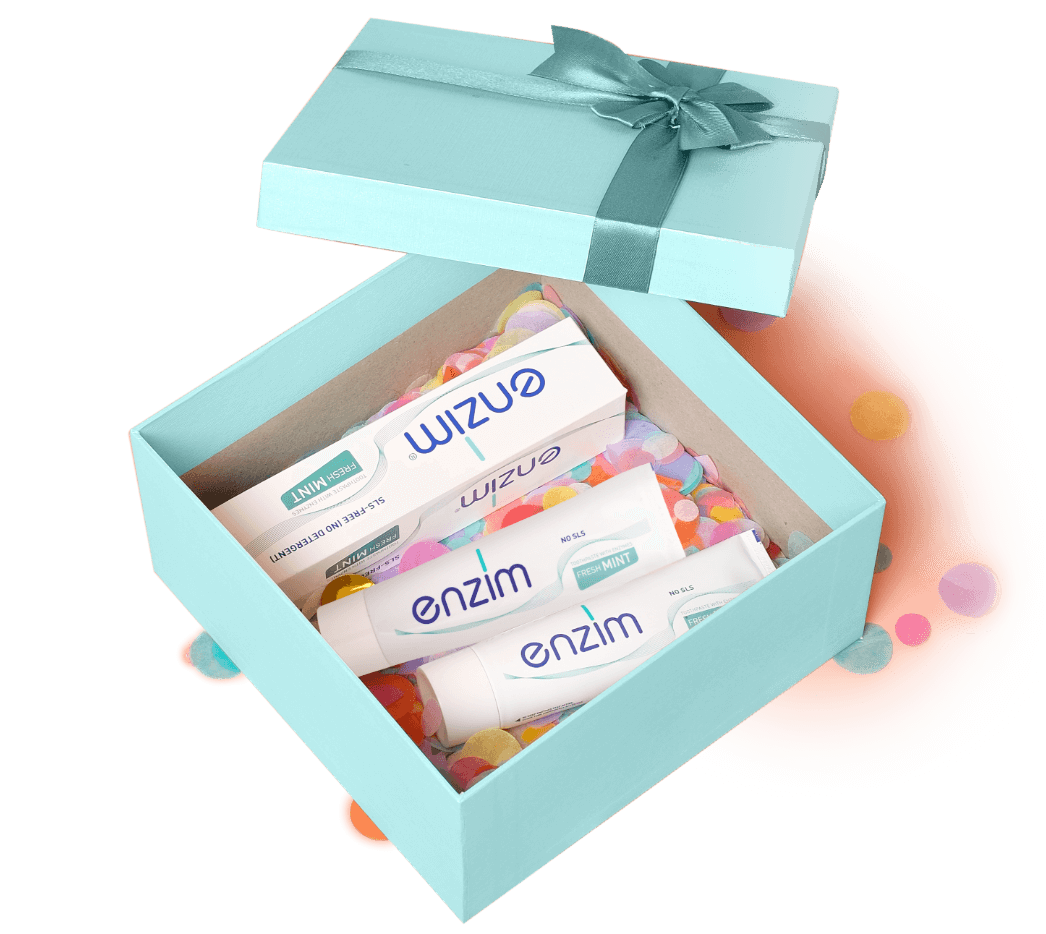Should You Use Toothpaste on Your Mouth Ulcers? Pros and Cons

Should You Use Toothpaste on Your Mouth Ulcers? Pros and Cons - Enzim Singapore
Should You Use Toothpaste on Your Mouth Ulcers? Pros and Cons
Mouth ulcers, or canker sores, are painful, open sores that can appear inside your mouth, causing discomfort when eating, drinking, or speaking. While most mouth ulcers heal on their own within a week or two, the pain and irritation they cause can be difficult to endure. Some people turn to toothpaste as a quick remedy to alleviate symptoms and promote healing. But is using toothpaste on mouth ulcers a good idea? In this article, we’ll explore the pros and cons of using toothpaste on mouth ulcers to help you decide if it's a suitable solution for you.
Pros of Using Toothpaste on Mouth Ulcers
-
Temporary Pain Relief Some toothpaste contains ingredients that can provide temporary pain relief for mouth ulcers. For example, menthol, a common ingredient in toothpaste, creates a cooling effect when applied to the ulcer. This sensation can numb the area for a short time, reducing the sharp pain or discomfort associated with mouth ulcers. Toothpaste can also soothe the surrounding tissue, making it easier to eat and talk without experiencing intense pain.
-
Anti-Bacterial Properties Many toothpaste brands contain fluoride, which helps to kill bacteria and maintain good oral hygiene. By using toothpaste on a mouth ulcer, you might reduce the risk of infection in the ulcerated area. Keeping the ulcer free from bacteria can prevent complications and potentially speed up the healing process. Some toothpastes also contain natural antiseptics like tea tree oil or aloe vera, which have healing properties.
-
Ease of Use Toothpaste is easily accessible and part of most people's daily routine. Applying toothpaste directly to a mouth ulcer is simple and convenient, especially compared to other ulcer remedies like gels or ointments, which may require more specialized purchases or frequent applications. If you're already brushing your teeth regularly, adding a quick application of toothpaste to the ulcer is effortless.
-
Soothing Ingredients in Some Toothpastes Some toothpaste formulas are designed with soothing ingredients like aloe vera, chamomile, and baking soda. These ingredients can reduce inflammation, cool the area, and create a less acidic environment in the mouth, which is less likely to irritate the ulcer. These toothpaste options may offer a gentle alternative for people looking to relieve ulcer pain naturally.
Cons of Using Toothpaste on Mouth Ulcers
-
Potential for Further Irritation While toothpaste may provide temporary relief, some ingredients can actually irritate mouth ulcers rather than soothe them. For example, toothpaste containing Sodium Lauryl Sulfate (SLS)—a common foaming agent—can cause a burning sensation, dryness, and irritation, especially in sensitive areas like ulcers. SLS can strip the mouth of natural moisture, which could delay the healing of the ulcer and exacerbate the pain. If you're prone to recurring ulcers, using toothpaste with SLS may even make the problem worse.
-
Not a Cure for Ulcers Toothpaste is not a cure for mouth ulcers. While it may alleviate symptoms temporarily, it doesn't treat the root cause or promote faster healing in a significant way. Mouth ulcers are often triggered by stress, hormonal changes, or other health conditions. Toothpaste can only manage the pain and discomfort but won't address underlying causes. For persistent or severe ulcers, professional medical treatment may be necessary.
-
Unnecessary Risk of Infection If the toothpaste you are using contains abrasives or other harsh chemicals, it can potentially damage the ulcer further, leading to an increased risk of infection. Additionally, using toothpaste directly on the ulcer could cause cross-contamination if your toothbrush isn't clean, especially if you’re using the same brush to apply the toothpaste and then brushing your teeth. This could introduce harmful bacteria into the open ulcer.
-
Sensitivity to Flavouring Agents Many toothpastes contain strong flavouring agents, such as mint, cinnamon, or menthol, which can aggravate mouth ulcers. The strong, sometimes spicy flavours can cause a burning or stinging sensation when they come into contact with the sore, intensifying the pain rather than providing relief. For people with sensitive ulcers, these flavourings can significantly increase discomfort.
-
Possible Delayed Healing While toothpaste might temporarily numb the pain, certain ingredients—especially if used repeatedly—can interfere with the healing process. Harsh abrasives or acidic ingredients in toothpaste may irritate the ulcer further and hinder tissue regeneration. If not careful, this could result in a longer healing time or make the ulcer more difficult to heal.
When to Use Toothpaste on Mouth Ulcers
While toothpaste may not be a long-term solution, it can provide temporary relief for minor, superficial mouth ulcers. If you're looking for quick comfort or need a soothing option between meals, toothpaste with baking soda or aloe vera may be worth trying. For those with recurring ulcers, however, it's important to choose SLS-free toothpaste to minimise irritation and help avoid future outbreaks.
Additionally, using toothpaste on ulcers should not replace proper treatment if the ulcer becomes particularly large, painful, or persistent. If the ulcer lasts longer than two weeks, or if you experience significant pain, swelling, or fever, it's important to consult with a healthcare professional to explore other treatments, such as medicated gels, ointments, or mouth rinses designed specifically for ulcers.
Conclusion
Toothpaste may offer temporary relief for mouth ulcers, particularly for alleviating pain and irritation. It can act as a convenient and easy-to-use option for those looking to manage symptoms. However, it's important to be mindful of the toothpaste's ingredients, as some may cause further irritation or dryness, especially those containing Sodium Lauryl Sulfate (SLS) or strong flavouring agents.
Ultimately, toothpaste should not be relied upon as a long-term or primary solution for mouth ulcers. For effective healing and to prevent recurrence, it's advisable to choose gentle, soothing, SLS-free toothpaste and explore other treatments. If your mouth ulcer persists or causes significant discomfort, consult with a healthcare provider for a more appropriate remedy tailored to your needs.
